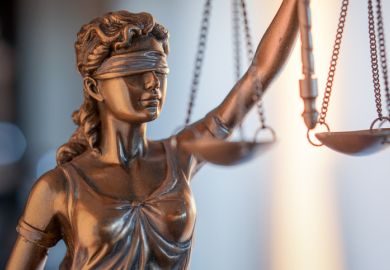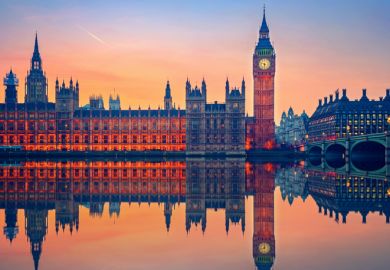Free speech legislation that aims to eradicate “cancel culture” at English universities could be used to protect those with extreme views, according to a former universities minister.
Lord Willetts predicted that the Higher Education (Freedom of Speech) Bill – which is expected to receive Royal Assent imminently – will result in “quite a lot of legal cases” from across the political spectrum.
Asked at a Westminster Higher Education Forum event on free speech whether the bill was just about protecting Conservative views, Lord Willetts – who has been involved in scrutinising the legislation in the House of Lords – said he did not think this would be the approach taken by the Office for Students (OfS) or the courts.
He added that he could foresee a situation whereby, for example, the bill’s protections could be claimed by “people with quite extreme Islamic views”.
Referencing a controversy surrounding the then universities minister Michelle Donelan in May 2021, who said the bill would allow someone who denies the Holocaust the legal right to speak at a university, Lord Willetts said she had been correct as “Holocaust denial is not of itself a criminal offence in the UK”.
Ms Donelan was eventually overruled by No 10, which said Holocaust denial would not be tolerated, but Lord Willetts said if this is to be the case then the OfS will have to outline how it intends to regulate universities using the new legislation in its long-awaited guidelines.
These guidelines have “not yet been shared with anybody in Parliament”, Lord Willetts said, a situation he described as “frustrating”.
He added that the document will also have to engage with other challenges such as what might happen if the rights granted by the bill appear to come into conflict with different pieces of legislation that universities are subject to, such as the Equality Act – which protects individuals against harassment – or the Prevent Duty, which aims to minimise the spread of extremist ideologies.
Appearing at the same event, Bryn Harris, the chief legal counsel for the Free Speech Union, said another potential issue when the bill is implemented will be universities arguing that freedom of speech within the law allows them to impose employment policies that can then restrict what academics say.
He agreed the new legislation “may see institutions performing a tightrope walk between compliance with this bill or, if they get it slightly wrong, potentially falling foul of the Equality Act”. But this could be dealt with by the OfS guidance, he said.
There needs to be “interplay” between free speech and HR committees to ensure overall compliance with all legislation, he said, adding that “universities are going to have a lot of work to do.”
Harry Anderson, policy manager for Universities UK, said the different duties being placed on universities was “creating a bit of confusion and uncertainty when universities are having to make these very sensitive, very difficult balancing acts”.
Lord Willetts said he remained concerned that the “much more intrusive regulatory regime” could have a “chilling effect” and result in a “safety-first” environment whereby no speakers at all are invited for fear of falling foul of the legislation.
The peer’s efforts to remove a statutory tort from the bill – which hands individuals the right to sue if they feel their free speech has been violated by institutions – were overturned when the legislation returned to the House of Commons.
He said there was potential for a “nightmare scenario” whereby a students’ union caught up in controversy could receive both a letter from the OfS saying they are being investigated and a lawyer’s letter saying they are being sued, adding that this felt like “overkill”.
The fact that changes to the bill agreed by the government now mean the tort can only be used after all other means of addressing the grievance have been exhausted felt like a “reasonable compromise”, Lord Willetts said.
Register to continue
Why register?
- Registration is free and only takes a moment
- Once registered, you can read 3 articles a month
- Sign up for our newsletter
Subscribe
Or subscribe for unlimited access to:
- Unlimited access to news, views, insights & reviews
- Digital editions
- Digital access to THE’s university and college rankings analysis
Already registered or a current subscriber? Login








